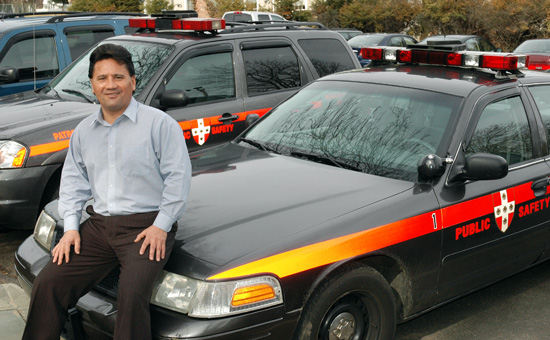Investigative Captain Helps Victims and Solves Crimes
 |
| Michael Kishimoto, investigative captain for Public Safety, joined the department in 1985. |
| Posted 03/16/07 |
| Police and public safety officers investigate crimes, direct traffic, attend public events to maintain order, patrols specified areas and ensures the safety of people in their community. But when it comes to helping victims of a crime, the Public Safety officers take this aspect of their job up a notch.
Sometimes, a student just wants to talk about a crime they were a part of, and its part of our jobs to listen and be concerned about their health and welfare, explains Michael Kishimoto, Public Safety’s investigative captain. Kishimoto, who joined the Public Safety staff in 1985, investigates up to 50 campus crimes a week. Solving the crimes is a goal, but Kishimotos top priority is working with victims and offering them support. He explains victims options, and how to proceed. Recently, hes helped a victim of sexual assault seek psychological counseling and move forward with her studies and life. Students tend to trust Captain Kishimoto, says David Meyer, director of Public Safety. They feel comfortable talking to him, and when students talk, it makes it easier for him to investigate crimes and get them solved faster. Since Kishimoto is the departments only investigative officer, his workload and hours vary week to week. Sometimes hes working days, other times nights. He frequently takes on weekend and holiday shifts and is almost always on call. He works primarily in the office, making follow-up calls and answering questions from students and parents. If time allows, he enjoys patrolling campus. Often, he is able to prevent a crime before it happens. Kishimoto gained his crime-solving skills during a six-year stint with the U.S. Army after high school. There, he worked as a sergeant with the military police. Afterwards, he applied for a Public Safety position at Wesleyan, and spent many years adjusting to the change of environment. Imagine going from the military police to a liberal college,” he says. It was quite a shock at first, but after 22 years I find myself more liberal than the students. Captain Kishimoto enjoys working with the Wesleyan students and strives to make sure everyone feels safe in their university home, while away from home. Although campus is spattered with emergency blue light call boxes and public safety officers are patrolling campus 24-hours, crimes can, and will happen. Unfortunately, many crimes are committed by fellow students, he explains. Hes seen the gamut of cases from neighbors stealing laptops, to students posting racial graffiti. The worst incidents, however, involve physical contact. Students can feel very safe on campus, but the problem is that they become too trusting, and that can become a problem, he says. Students should always walk in pairs at night, lock their doors if they leave, and always be mentally prepared incase someone comes up to them from behind. You just never know what can happen. Kishimoto, son of a Japanese-Hawaiian father and an Irish mother, grew up in East Hartford, Conn. with his four brothers. He currently lives on a 26-acre farm in Andover, Conn. with his wife, Christina; 6-year-old daughter, Maria; and a giant pond stocked with large-mouth bass. If I could be a full time fish farmer or fisherman, Id do that, but since I have to work, Public Safety isnt a bad place to be, he says, smiling. Its good to work around the students. They keep me young. |
| By Olivia Drake, The Wesleyan Connection editor |

